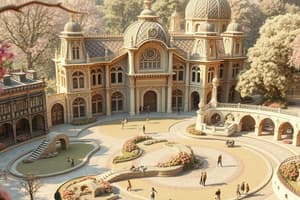Podcast
Questions and Answers
What is architecture?
What is architecture?
The art and science of designing and constructing buildings.
Which of the following are the three fundamental principles of architecture identified by Marcus Vitruvius Pollio?
Which of the following are the three fundamental principles of architecture identified by Marcus Vitruvius Pollio?
- Firmitas
- Utilitas
- Venustas
- All of the above (correct)
The principle of __________ refers to the structural integrity of a building.
The principle of __________ refers to the structural integrity of a building.
firmitas
__________ refers to the functional needs of occupants in architectural design.
__________ refers to the functional needs of occupants in architectural design.
What does venustas represent in architecture?
What does venustas represent in architecture?
Which of these is NOT a type of residential building?
Which of these is NOT a type of residential building?
A single-detached house is connected to neighboring houses.
A single-detached house is connected to neighboring houses.
What defines a rowhouse?
What defines a rowhouse?
What is the thickness of an exterior wall?
What is the thickness of an exterior wall?
What is a party wall?
What is a party wall?
Apartments are usually owned by multiple people who share the property.
Apartments are usually owned by multiple people who share the property.
Flashcards are hidden until you start studying
Study Notes
Architecture
- Defined as the art and science of designing and constructing buildings
- Art: The conscience use of skill, craft, and creative imagination in the production of what is beautiful, appealing, or of more than ordinary significance
- Science: Refers to the application of scientific principles, knowledge, and research methodologies to inform and enhance the design, construction, and functionality of buildings and built environments
Three Fundamental Principles
- Firmitas (Firmness): The building's structural integrity
- Utilitas (Utility): Efficient arrangement of spaces and mechanical systems to meet the functional needs of its occupants
- Venustas (Beauty): The aesthetic quality associated with style, proportion, and visual beauty
Scale of Design
- Designing Objects: Focuses on furniture, fixtures, decorative elements, user ergonomics, and material choices
- Designing Spaces: Considers functionality and purpose, spatial hierarchy and zoning, proportion and scale, circulation and accessibility
Residential Buildings
- Single-Attached: One side of the house is built in the boundary of the lot. A shared wall is built between two properties.
- Single-Detached: A residential building unattached to neighbors with space on all sides.
- Rowhouse: A series of houses connected by common sidewalls forming a continuous group of low-rise homes.
- Townhouse: Single-family house of two or three stories usually connected by a common sidewall.
- Condominiums: Residential properties within a multi-storey building that shares walls and residents usually share repair costs.
- Apartments: Owned by one person who rents it to tenants, with multiple units sharing walls.
Building Envelope
- Exterior Wall: Also known as outer wall or façade, separates the interior spaces from the external environment.
- Interior Wall: A partition inside a house or structure that separates different spaces within a building’s interior.
- Party Wall: A shared wall that separates two adjoining properties or buildings serving as a structural and legal division.
Wall Thicknesses:
- Exterior Wall: 0.15 meters
- Interior Wall 0.10 meters
- Party Wall: 0.20 meters
Studying That Suits You
Use AI to generate personalized quizzes and flashcards to suit your learning preferences.




